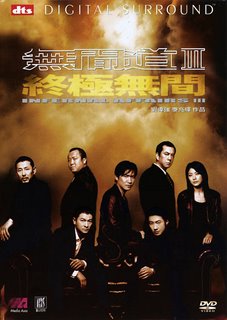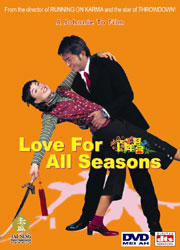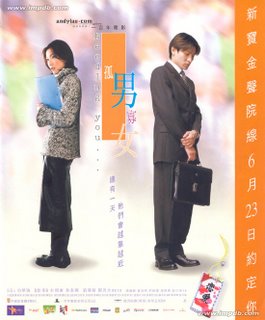IMPORTANT: This is my sole personal opinion about the two films. Anyone who read this may or will disagree with some of my reasonings. However, I just intend this to be at the least, an interesting read about two great movies and its counterparts. It would also be advised that you have already watched both film for it does contain various SPOILERS.
 DIRECTION:
DIRECTION: The Departed:
The Departed: Martin Scorsese did a masterful job in directing this crime thriller with sophistication, wonderful editing and the pacing is superior to the one found in Infernal Affairs. Scorsese had his finger prints all over this one with his signature bundle of foul mouth tough guys, comical one-liners, raw human anger and emotions, and violent action sceens. Not Scorsese's best, but it ranks up there.
A-Infernal Affairs: Doesn't rack up as great a work as Scorsese in term of pacing and direction in performance. However, Andrew Lau Wai-Keung and Alan Mak Siu-Fai holds up their own in term of shear style and quiet emotions. Lau and Mak's film definitely looks prettier, but it also contain various plot-holes and a bit swallow back stories.
B
PERFORMANCE: The Departed:
The Departed: Both movies contain a cast of notiable name on both side of the shore. Leonardo DiCaprio's and Matt Damon's performance were both great, but the star of the show was Jack Nicholson's portrayal of the mob boss Costello. His raw and almost evil take on the villian grip the audience to the screen and his screen presence is undeniable. It's also nice to note that Nicholson did many of the scenes improvised. Apparrently greatness doesn't need to follow a script.
AInfernal Affairs: Although not as raw or as in-your-face as Leonardo, Matt or Jack; Andy Lau, Tong Leung and Anthony Wong's own way of quiet and restrait emotions fits beautifully in the Hong Kong crime scene. Instead of trying to say how they felt in the movie, a simple eye contact, a scratch on the head, or a finger rubbing the lips does the job perfectly. That's not to say that the western actors ignored body language, but that the Hong Kong actors rely more on it than physical speech.
A-Cinematography:
The Departed: As much as I liked Scorsese's direction and the amazing editing, the camera angles in the movie doesn't hold up to the Hong Kong version. In one of the key scenes in the movie, Martin Sheen gets thrown out of a building when the mob was informed by Matt Damon. As Leonardo races down the building, a scene of Sheen's body is shown falling and moments later, it lands right in front of Leon and blood splittered onto his hands. Ok, that was pretty cool, but what about the Hong Kong version? As Tony Leung comes down from the sky scrapper on the back using an elevator lift outside, he calls a cab to rush back to the entrance to see if his mentor and boss Anthony Wong would be safe. As the walks out of the cab and into the building, the audience could still see the focus taxi on the background to his right; something's wrong and moments later, a body crashed down on the taxi and Tony Lueng quickly turns his head and sees Anthony Wong lying dead on top of the car eyes open.
B-
Infernal Affairs: At the end of the film when Tony's character found out about Andy's character secrets, he request to meet up with him at a rooftop of a sky scrapper. Once the two met, they exchange words while the audience see the wide scape of the Hong Kong industrial landscape. Andy said something to provoke Tony after Tony's rejection to help Andy; Tony points a gun at Andy's head switching the camera to a close up shot of Andy's eyes as he eyebrows tadded a pit; audience speculate whether it was fear of the gun or fear that his life as a cop is over. Seconds later, the camera moves back to see the two man standing in a standstill. In the Departed, Matt Damon walks up to the rooftop, Leonardo sees him and beat the crap outta Matt.
A
Themes and Values:
Infernal Affairs is a decent english title for the Hong Kong film, but for anyone who can read chinese, the original title of the film portray a much more detail view of the movie. "Mou Gaan Dou" roughly translate to "On the Road to the Final Level of Hell". Mou Gann is basically the eighteenth and final level of hell in the buddist religion; it is the level of hell where the worst criminals and the worst humans would proceed in the afterlife. At its core, there is no pain, no suffering, no sadness; mou gaan is simply nothingness for eternally and it is a point of no return. It fits the film well because it suggests that both main actors are slowly entering this abyss, that what they proceed to do will force them to never return to their former self.
The Departed on the other hand follows closer to the christian belief of the dearly departed and how they would always be remembered. The concept is just as plausible for a western movie, but the film script was written orginially to convey a sense of being forever lost and not rememberance of the departed.
However, nothing annoyed me more than The Departed's emphasis on money. In the Hong Kong version, Tony Leung went undercover to fulfill his duties as a polic officer and did it with honor and pride of the justice of the Hong Kong enforcement. Leonardo did it for the "extra bonus" and that it's "tax free". It's "tax free" Leonardo, now you have to do it! I'm sure that Leonardo does indeed want to be a cop and that it is the only way for him to be effective since his family was so caught up in criminal actions, but it does not disregard the fact that he also did it for the money. Leonardo even request that he recieve his share of the money to Matt Damon after they took out Costello at the end of the film. Also, The Departed depict Asian mobs as foolish and for-a-lack-of-a-better-word, a pussy during one of the scene in the movie. The Departed even stress the fact that the Chinese mob are trying to steal valuble computer chips to start a war or something. I personally felt that it was almost like a stab in the back for them to use a script written originally as a Hong Kong film and bashed it up to target the Chinese as one of the antagonists.
The Departed use various violence and sex to illustrate the Boston crime scence. Sometimes its almost too much for its own good. In the Hong Kong version when Andy meets his boss Eric Tsang, they met in a theater showing a quiet western movie. In the American version, Matt meets Jack in a porno movie theater. In the American version when Jack tries to speak with Leonardo, he puts out a fresh chopped hand with fresh blood for Leonardo to see. In the Hong Kong version, Eric Tsang simply talks to Tony with a relaxed but still tense atomsphere.
The Departed: F
Infernal Affairs: A-
Both film were successful in their own rights. Techinally, The Departed is a better film overall, but I felt Infernal Affairs does have some stronger parts such as its camera work. However, it is from the themes and how The Departed portray some things that made me really hate the film. I'm sure that watching American remake of "Mou Gaan Dou" wouldn't seem very offensive or weird to the average American who has never saw the original Hong Kong film, but to someone like me, I really grew to dispite the movie. I was overally surprise when I saw the Oscar and saw firsthand that the American remake won Best Picture because I really didn't think it deserves it. In a techincal standpoint, The Departed is a better movie, but that doesn't stop me from hating it.




















